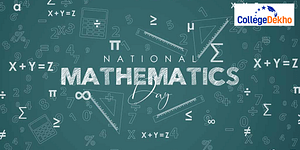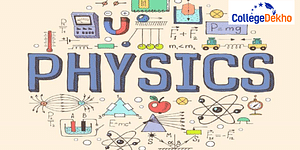BSc Physics Syllabus & Subjects 2025
BSc Physics Syllabus and Subjects 2025 cover core subjects like Electromagnetism, Optics, Calculus, Thermodynamics, Semiconductors, Statistics and others. You must have passed grade 12th from the science stream with at least 50% to seek this course.
BSc Physics Syllabus and Subjects 2025
BSc Physics Syllabus and Subjects 2025 include different aspects associated with natural science such as electricity, optics, mechanics, kinetic theory, quantum physics, waves, electro dynamics, energy, power, magnetism, thermal dynamics, and many other corresponding subjects. BSc Physics stands for Bachelor of Science in Physics which revolves around the study of Physics and the components circling around it.
It is one of the most sought-after courses established on the basic principles of physics and natural science. When you will be pursuing a BSc Physics course This is a three-year undergraduate course that is classified into six semesters. In this course, you will learn both theoretical as well as practical subjects. Each semester comprises laboratory subjects, theoretical subjects, and practical examinations.
If you want to pursue a BSc in Physics, you should delve into the details regarding its syllabus and subjects to have adequate knowledge. BSc Physics is an extremely comprehensive course and requires enthusiastic dedication and perseverance to deal with intricate theories and principles. In case you wish to have a career in the area of science and scientific background, you can opt for this program.
Table of Contents
- BSc Physics Syllabus and Subjects 2025
- Semester-wise BSc Physics Syllabus and Subject 2025
- Core Subjects for BSc Physics Syllabus and Subject 2025
- Elective Subjects for BSc Physics Syllabus and Subject 2025
- Lab Subjects for BSc Physics Syllabus and Subject 2025
- BSc Physics Syllabus and Subject 2025 Course Structure
- BSc Physics Syllabus and Subject for Entrance Exam
- BSc Physics Teaching Methods and Techniques
- BSc Physics Projects
- BSc Physics Important Books
- Courses after BSc Physics
- FAQs about BSc Physics Syllabus
Semester-wise BSc Physics Syllabus and Subject 2025
When you seek a course program in BSc Physics, you will get to study an academic curriculum that will provide you with both theoretical as well as practical knowledge throughout the entire course duration. The BSc physics syllabus is divided into six semesters for three years along with practical exams, lab, and theory. However, the subjects might vary with different colleges.
You can check out semester-wise syllabus for BSc Physics:
BSc Physics First Year Syllabus
Tabulated below is the syllabus that you will be studying in the first year of your course program.
| Physics Subjects Semester- 1 | |
|---|---|
| Mechanics and Properties of Matter | Physical Chemistry 1 |
| Foundation Course in Mathematics | English/MIL Communication |
| Mathematics Physics 1 | Electricity and Magnetism |
| Physics Lab 1 | |
| Physics Subjects Semester- 2 | |
| Wave and Optics | Calculus |
| Environmental Studies | Digital System and Application |
| Wave and Optics Lab (Practical) | Organic Chemistry |
| Physics Lab 2 | |
BSc Physics Second Year Syllabus
Here is the syllabus that you will be studying in the second year of your course program.
| Physics Subjects Semester- 3 | |
|---|---|
| Solid-state Physics | Inorganic Chemistry 1 |
| Open Elective | Thermal Physics |
| Biophysics and Radiation Science | Analog systems and applications |
| Physics Subjects Semester- 4 | |
| Basic Electronics | Classical Mechanics and Relativity |
| Nuclear Physics | Thermal Physics Lab (practical) |
| Mathematical Physics | Analog systems and applications lab |
BSc Physics Third Year Syllabus
Mentioned below is the syllabus that you will be studying in the first year of your course program.
| Physics Subjects Semester- 5 | |
|---|---|
| Oscillations & Waves | Quantum Mechanics |
| Applied Optics | Electromagnetic Theory |
| Statistical Mechanics | |
| Physics Subjects Semester- 6 | |
| Renewable Energy | Instrumentation |
| Particle and Astrophysics | Quantum Mechanics Lab |
| Atomic and Molecular Physics | |
Core Subjects for BSc Physics Syllabus and Subject 2025
In the core subjects, you will learn about the basic principles of physics, including quantum mechanics and relativity, thermodynamics, classical mechanics, electrodynamics, and others. Given below are the core BSc Physics subjects that you will be studying in your course program.
- Mechanics: It will include Classical Mechanics, Relativity, and Statistical Mechanics and covers the study of motion, energy, and forces, embracing both classical and quantum mechanics. You will study the law of inertia, speed, Newton’s latent capacity, Kepler movement and state of matter and more.
- Electricity and Magnetism: This branch of physics deals with the multifaceted relationship of electric and magnetic fields, in addition to their origination, impacts on matter, and interaction. You will get to learn concepts like dielectric properties of matter, network theorems, magnetic field, magnetic properties of matter, electromagnetic induction, electrical circuits, and electric field and electric potential.
- Waves and Optics: In this subject, you will get an overview of the classification and personality of waves, together with light as an electromagnetic wave, all-embracing concepts such as diffraction, propagation, interference and polarization.
- Mathematical Physics I: Provides you with a comprehensive understanding of fundamental arithmetical instruments and strategies used in physics, emphasizing concepts such as differential equations, calculus, vector algebra, linear algebra and others.
- Thermal Physics: Thermodynamics covers the study of thermal applications in the different thermodynamic systems, like refrigerators, engines, and the atmosphere. This subject covers a wide range of topics such as Maxwell’s thermodynamic relations, kinetic theory of gasses, zeroth and the first law of thermodynamics, the second law of thermodynamics, molecular collisions, entropy, real gasses, and thermodynamic potentials.
- Nuclear and Particle Physics: Offers an in-depth understanding of matter and its relations, surrounding both the study of protons and neutrons and elementary particles that describe the intricate structure of atoms.
- Electronics and Instrumentation: It is the study of the standards and applications of electronic devices and techniques for estimating, managing, and automating procedures. Plus, it covers areas, such as data acquisition, instrumentation systems, and sensors.
- Mathematical Physics II: With this subject, you will get profound insights into advanced mathematical practices and their applications to different physics concerns, encompassing integral transforms, Dirac delta function, orthogonal curvilinear coordinates, differential equations and complex variables.
- Quantum Mechanics I: Mainly, this subject teaches you about the fundamental concepts and ideas related to quantum mechanics. It includes concepts like the independent Schrodinger equation, electron atoms, and a discussion of bound states in an arbitrary potential.
- Solid State Physics: Revolves around the study of the physical aspects of solid materials, along with their electronic behaviour, interactions, and structure, by implementing methods like crystallography, quantum mechanics, and electromagnetism.
- Atomic and Molecular Physics: This subject explores the constituent elements of matter – atoms and molecules – and their interactions, as well as their energy levels, interactions, and electronic structure with electromagnetic radiation.
- Computational Physics: This subject acknowledges the use of computational approaches and conclusions to figure out complicated physics problems that are challenging to examine.
- Quantum Mechanics II: Provides you insight into the core fundamentals of Quantum Mechanics I with the help of more refined concepts comprising radiation-matter interaction, atoms in Electric and magnetic fields, spin and identical particles, quantum theory of hydrogen-like atoms, and approximation methods.
- Advanced Electrodynamics: This branch of physics explores topics such as electromagnetic waves, radiation, Maxwell's equations, and special relativity, usually with the objective of cutting-edge mathematical approaches.
- Nuclear Physics and Applications: You will get to study atomic nuclei, their components (protons and neutrons), the interactions that control their conduct, and their components (protons and neutrons), along with nuclear reactions and radioactivity.
- Condensed Matter Physics: This subject comprises the study of solids and liquids encompassing a wide range of topics, such as crystal structures, superfluidity, and its magnetic, thermal, and electrical behaviour.
- Statistical Mechanics and Applications: With this subject, you will get a deep understanding of the conduct of systems composed of a large number of particles that involves topics related to kinetic theory, probability and statistics, thermodynamic systems and others.
- Astrophysics and Cosmology: In this subject, you will get to study the whole universe and the behaviour of celestial objects.
- Material Science: This subject comprises physics, chemistry, and engineering, teaches you about the applications and properties of different materials, and helps you develop experimental and problem-solving skills.
- Project/Dissertation: It helps you develop research skills, demonstrate your expertise, and implement your theoretical knowledge to real-world concerns.
Elective Subjects for BSc Physics Syllabus and Subject 2025
There are various options to choose from when it comes to BSc physics elective subjects. You can select the one that adheres to your career goals and interests. Mentioned below are the popular elective options:
- Geophysics
- Biophysics
- Medical Physics
- Nanotechnology
- Environmental Physics
- Computational Physics
- Robotics
- Artificial Intelligence
- Machine Learning
- Data Analysis
Lab Subjects for BSc Physics Syllabus and Subject 2025
When you will be pursuing the course program, you will have to partake in the lab sessions regularly. With this, you will get to put the theoretical concepts to use. In BSc physics lab subjects, you will get to learn topics, like:
- Mechanics Lab
- Electricity and Magnetism Lab
- Waves and Optics Lab
- Electronics and Instrumentation Lab
- Nuclear and Particle Physics Lab
- Solid State Physics Lab
- Physics Lab V
- Physics Lab VI
BSc Physics Syllabus and Subject 2025 Course Structure
The course structure of BSc Physics is kind of similar to any other regular BSc program. During the course duration of three years which is further divided into six semesters, you will get to amplify your understanding and knowledge of physics through the medium of various practical and theoretical classes. Apart from that, you will also be participating in different lab classes to enhance your theoretical knowledge.
The syllabus for BSc Physics is specifically curated to provide a thorough understanding of scientific and technical aspects of physics. Besides that, you will indulge in making projects related to your course program providing you with an extensive understanding of your subject. While the course structure is likely to differ from every other college to university, the essence of the course structure remains intact.
Nonetheless, the common course structure may include these aspects:
- 6 semester
- Project Submission
- Lab experiment
- Practical
Also Read: Top 8 Opportunities after GATE 2025 Result
BSc Physics Syllabus and Subject for Entrance Exam
You can enrol in prestigious universities/colleges to pursue a BSc physics. Most of the colleges and universities provide admissions through their entrance exams. Given below is a list of entrance exams and their syllabus that you can consider:
| Exam Name | Description | Exam Syllabus |
|---|---|---|
| CUET (UG) | The Central University Entrance Test, conducted by NTA, is for admission to BSc Physics in central universities. The test includes Physics, Chemistry, Mathematics, and General English. | CUET Syllabus |
| JEE Main | Joint Entrance Examination Main is mainly for engineering but some universities use it for BSc Physics admissions. It covers Physics, Chemistry, and Mathematics. | JEE Main Syllabus |
| JEE Advanced | Joint Entrance Examination Advanced is for top IITs and NITs for engineering, and some IITs consider JEE Advanced scores for BSc Physics admissions. | JEE Advanced Syllabus |
| IISER Aptitude Test (IAT) | Indian Institutes of Science Education and Research have their entrance exam for BSc programs, including Physics, covering Physics, Chemistry, Mathematics, and Biology. | IISER Aptitude Test Syllabus |
| TIFR Entrance Exam | Tata Institute of Fundamental Research holds exams like GS, GSAT, and JEST for BSc Physics admissions, among other science programs. | TIFR Entrance Exam Syllabus |
| BHU UET | Banaras Hindu University conducts its Undergraduate Entrance Test for BSc Physics admissions, covering Physics, Chemistry, and Mathematics. | BHU UET Syllabus |
| JMI Entrance Exam | Jamia Millia Islamia has its entrance exam for various programs, including BSc Physics, covering Physics, Chemistry, and Mathematics. | JMIEE Syllabus |
BSc Physics Teaching Methods and Techniques
To provide students with a comprehensive understanding of BSc Physics, seasoned professionals use different methods. Having that, you can also expect teaching through video lectures and PowerPoint presentations, rather than using the standard approach. You will be taught with other methods such as case studies, help of demonstrations, and problem-solving techniques along with others. In laboratories, teachers will teach you methods like deductive methods, scientific method skills, discovery, and technical skills.
Some more techniques are given below:
- Demonstration
- Project report
- Hypothesis-making and discussion
- Experiment
- Problem-solving exercises
Also Read: List of Top 10 MBA Specialisation in 2025: Choose the Best One
BSc Physics Projects
Primarily, the BSc physics syllabus and subject 2025 deal with the study of nature to comprehend how the world works. Moreover, you get to study the basic concepts of electricity, magnetism, power, etc. In order to provide you with a better understanding of the subject, you will have to participate in a wide range of projects. Below is a listicle of a few common projects that you might encounter:
- A Study into energy gap in superconductor
- Design and Construction of an antenna booster
- Analysis of the effect of solar power
- The Phenomenology of jets in astrophysics
- Construction and Application of Heat Sensor
BSc Physics Important Books
Books can be your greatest supporters while pursuing a course program in BSc Physics to have a better idea. It will help you gain deep learning and amplify your concepts of the program. To help you, here we have provided you with a listicle of course books along with the names of authors:
BSc Physics First Year Books
Tabulated below is a list of books that you will need in the first year of your course program:
| Name of the Book | Author |
|---|---|
| Fundamentals of Physics | - R.Resnick, D. Halliday and Walker; Wiley 6ed (2001) |
| Physics-Classical and Modern | FJ Keller, W. E. Gettys and Malcolm J Skove, McGraw Hill Second Revised Edition(1993) |
| Classical Mechanics | -K N Sreenivasa Rao, Universities Press- Orient Longman (2003 ed) |
| Elements of Properties of matter | D S Mathur, S.chand(GL) |
| Heat and Thermodynamics | Brij Lal and N Subramanyam |
| Heat, Thermodynamics & Statistical Mechanics | Brij Lal & Subramanyam |
| Concepts of Physics Vol (1) | H C Verma |
| Newtonian Mechanics | A P French |
| Mechanics & Thermodynamics | G Basavaraju & Dipan Ghosh |
| Waves & Oscillations | P K Mittal & Jai Dev Anand |
BSc Physics Second Year Books
Provided below is a list of books that you will be studying in the second year of your course program:
| Name of the Book | Author |
|---|---|
| Electricity and magnetism | Brij Lal and N Subrahmanyam, Ratan Prakashan Mandir, Nineteenth Edition, 1993 |
| Introduction to Electrodynamics | DJ Griffiths Pearson Education (2015) |
| Electromagnetism | BB Laud 2ed |
| Optics | Ajoy Ghatak, Tata Mc Graw Hill, 4th Edition |
| Introduction to Modern Optics | Ajoy Ghatak, Tata McGraw Hill Publications (2009) |
| Principles of Optics | B K Mathur, Gopal Printing Press, Kanpur, 6th Edition, (1996) |
| Mathematical Physics | B D Gupta, Vikas Publishing House, 4th ed (2016) |
BSc Physics Third Year Books
Tabulated below is a list of books that you will need in the third year of your course program:
| Name of the Book | Author |
|---|---|
| Quantum Mechanics | B.H. Bransden and C.J. Joachain |
| Modern Quantum Mechanics | J.J. Sakurai |
| Statistical Mechanics, An Introduction | Evelyn Guha |
| Weather, climate and atmosphere | Siddartha. |
| Statistical Mechanics | K.Huang |
| Astrophysics Concepts | M. Herwit: John Wiley, (1990) |
| Introduction to solid State Physics | Charles Kittel, VII edition, (1996) |
| Electronic Devices and Circuit Theory | Robert Boylestad and Louis Nashelsky |
| Essential of crystallography | M A Wahab, |
| Quantum Mechanics | B.H. Bransden and C.J. Joachain, |
Courses after BSc Physics
Once you complete a course program in BSc Physics, you can opt for the following programs:
- Masters of Science in Physics (MSc): When you opt for an MSc in Physics, you will be studying a wide range of topics including high-energy physics, lasers, quantum optics, nonlinear optics, and solid-state physics.
- MSc in Biophysics: MSc in Biophysics is a postgraduate degree program that comprises the study of physical science methods to investigate biological systems.
- MBA in Data Science: With the program MBA in Data Science, you can work on your analytical skills along with business management skills. You can also opt for the Best Online Data Science Course.
- MBA in Information Technology: When you complete a BSc in Physics, you can pursue an MBA in IT. If you have a strong in-depth knowledge of people management and leadership skills, this is for you. You just need a bachelor's degree in order to be eligible for this program.
- Integrated MSc-PhD: This is a 5.5-year course program that encourages you to indulge in research in different subfields of physics.
Popular Courses
FAQs about BSc Physics Syllabus
Is the BSc Physics syllabus hard?
The level of complexity of the BSc Physics entirely depends on your background and capacity to learn scientific concepts. If you have a solid foundation in maths and physics, you may find it easier but it could seem challenging if your base is not that strong. However, when you start attending classes, studying consistently and seeking help from professors, you can effortlessly master your syllabus.
What are the BSc Physics subjects in 3rd year?
In the third year of your BSc Physics program, you will receive an in-depth exploration of diverse physics branches. It will cover advanced subjects such as Solid State Physics, Nuclear Physics, Statistical Mechanics, and Astrophysics. This specific curriculum intends to foster you with a comprehensive understanding, setting the foundation for professional endeavours and complex research in your desired area.
What are the BSc Physics subjects in 2nd year?
In the second year of a BSc Physics syllabus, you will acquire a profound understanding of advanced concepts. It will incorporate subjects like Atomic Physics, Electrodynamics, Quantum Mechanics, Thermodynamics, and Mathematical Physics. With these subjects, you will comprehend the principles governing the physical world, building a solid foundation for advanced studies in subsequent stages of your course.
What is the course duration of the BSc Physics course?
The minimum duration for a BSc Physics course in India, as per UGC guidelines, is three years. This applies to both Bachelor of Science (BSc) and Bachelor of Science (Honours) Physics programs.
Does a BSc Physics course have a good scope in future?
Yes, a BSc Physics course offers excellent future prospects. Graduates can pursue diverse careers in research, technology, data science, education, and more. The analytical and problem-solving skills acquired during the program make BSc Physics graduates highly sought after in various industries, ensuring a promising and rewarding career path.
What can be done if I fail in any of the subjects of the BSc Physics course?
If you encounter difficulties or fail in any BSc Physics course subject, it's advisable to consult your professors or tutors for guidance. Seek additional support through tutoring or remedial classes. Most importantly, develop a structured study plan and dedicate extra effort to understanding the concepts.
What is the percentage that is considered good in a BSc Physics Course?
If you get more than 60% in the BSc Physics course program, it will be a decent percentage. You should try to work hard and attain as much as you can as it will help you get admission into prestigious universities for higher education.
What are the BSc Physics subjects in 1st year?
In the first year of a BSc Physics program, you will need to gain a strong grasp of the essential principles of Physics. It will cover subjects such as Classical Mechanics, Electricity and Magnetism, Mathematical Methods, Quantum Mechanics, and Electronics.
What are the entrance examinations that are being taken for BSc Physics admission?
Is Mathematics subject compulsory at 12th class for BSc Physics admission?
Yes! In nearly all universities, having a background in Mathematics is important for enrolling in a BSc Physics program and studying BSc Physics subjects and syllabus. Think of it as the key that opens the door to understanding the language of the universe! Physics involves equations, formulas, and calculations, and a solid math foundation makes it much easier to grasp these concepts.
What is the average placement package after pursuing a BSc Physics course?
In India, the initial salary after completing a BSc Physics degree can vary widely, typically ranging from INR 2 to 7 lakhs annually. This variation is influenced by factors such as the university you attended, your academic performance, your chosen specialization, and the current trends in the industry. Exceptional performers and those in specialized fields, such as data science or renewable energy, might even command salaries exceeding INR 10 lakhs or more.
What is the average BSc Physics program course fee?
The cost of pursuing a BSc Physics program in India varies based on factors like the college, location, and program type (general vs honours). On average, it can range from INR 20,000 to INR 3.5 lakhs for the entire course, and in prestigious institutions, it might reach INR 5 lakhs. Remember that scholarships and government aid can help considerably reduce these expenses!
What are the best BSc Physics colleges?
Well, there are a lot of prestigious colleges where you can get a world-class education for BSc Physics Syllabus and Subject 2025. Some of the best colleges that offer BSc Physics program are St. Xaviers Mumbai, BSc Physics are Hindu College, Mirinda House, Jai Hind College Mumbai, Fergusson College Pune, St. Stephens College, Kirori Mal College, Christ University Bangalore, IISc Bangalore, and others.
- Courses
- BSc Physics
- Syllabus & Subjects


















